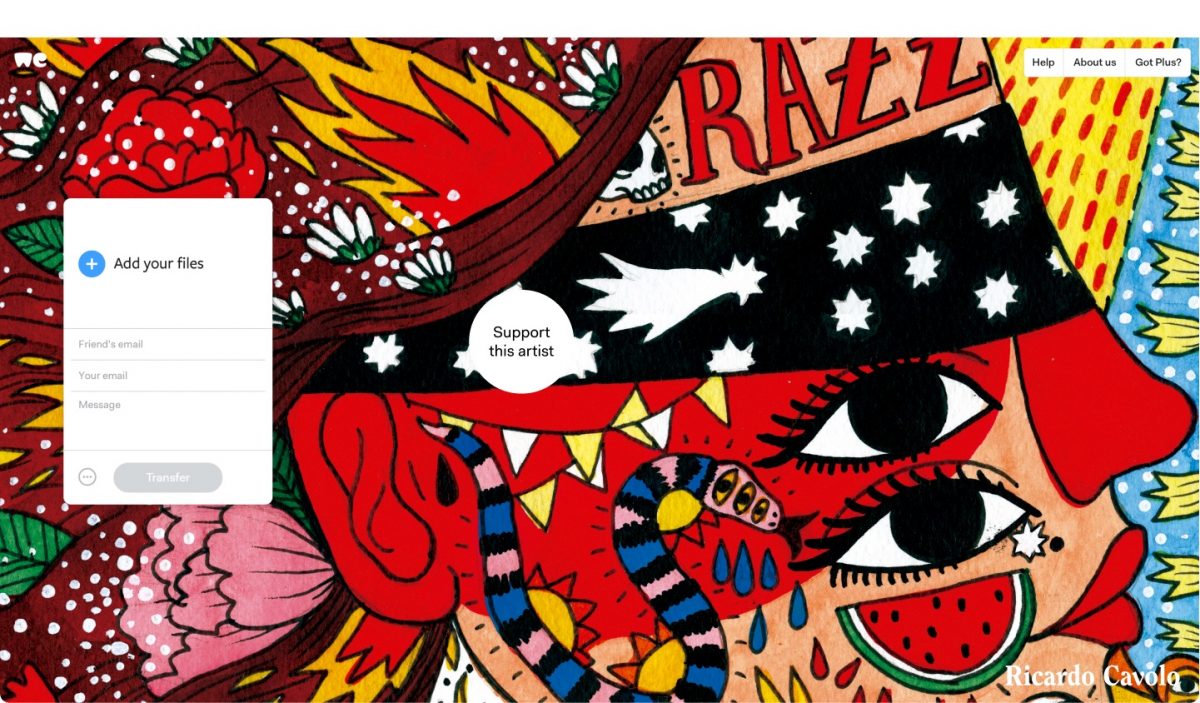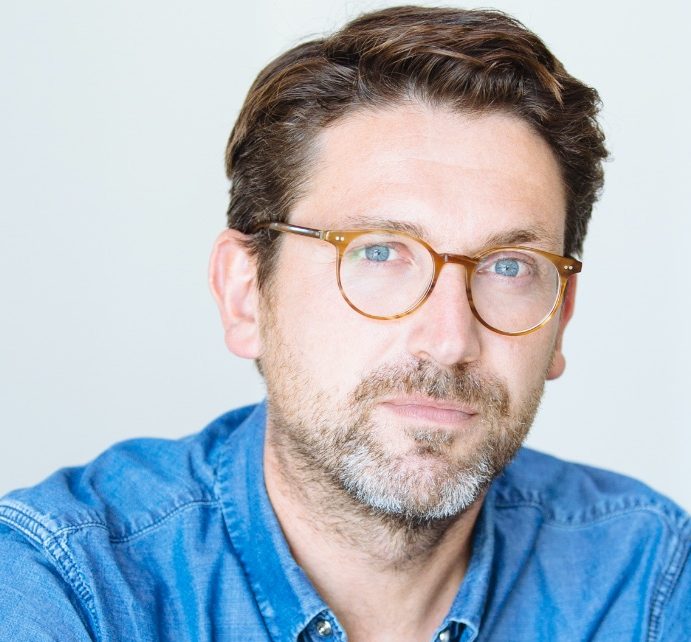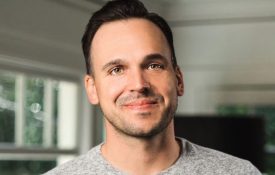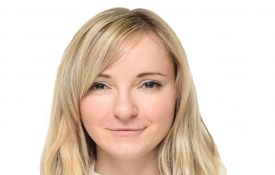What are your biggest business concerns surrounding COVID-19?
My major concerns during this time aren’t business related at all, but family and society as a whole. We have had 10 amazing years of growth and have never experienced anything like this. We have three main priorities stemming from this outbreak. First and foremost, we prioritize the safety of our employees and their loved ones. Secondly, we are focused on continuing to serve our community as best as we can in the present moment and remain optimistic for the future. Lastly, we know the creative community has been significantly impacted by this pandemic, as social distancing and quarantine efforts have forced many artists to lose their jobs, as well as galleries and cultural centers close their doors.

A WeTransfer wallpaper that gives back to artist Ricardo Cavolo.
What is your current business strategy for dealing with the situation?
Since the COVID-19 situation continues to evolve day-by-day, we are taking a proactive approach to ensure business continuity. Ultimately, we can anticipate an increase in demand for some of our products and a decrease in demand for others. We can share that in the first couple of weeks of lockdown we’ve seen a 15% spike in usage in our set of tools that supports remote teamwork, creativity, and productivity in the last few weeks and, understandably, a decrease in advertising spend, but with nearly a 40% increase in readership on our editorial platform WePresent, which showcases the best in art, photography, music, and more, offering more than 2 million monthly readers a fresh take on the maddening mystery of creative ideas.
How do you think things will look in your industry a year from now?
It’s clear that the way we work will never return to how it once was. Our current situation has dramatically changed how we stay connected and productive when we work from home, especially as we learn how to navigate daily distractions like trying to keep our kids occupied and working around our spouse’s schedules. Many companies are now, for the first time, realizing how to work remotely, and this will have a significant impact on how we operate a year from now. We will likely see companies moving toward a more decentralized workforce as we become more accustomed.
The creative community will become more resourceful and agile. We recently partnered with musician Grimes, who put out an open call for people to create their own version of her music video, and collaborated with WeTransfer to distribute the raw video files, our partner radio station Worldwide FM is seeing a huge lift in listenership as people look for a live experience and the university we sponsor “University of the Underground” switches to online-only courses.
Our focus now is on supporting our users and doing our best in lending a hand to the creative community, like we always have.
Business as a force for good is at the core of WeTransfer and companies will also need to do their part in supporting creative communities, freelancers, and small businesses. Our focus now is on supporting our users and doing our best in lending a hand to the creative community, like we always have. We are offering some of our tools for free, such as Paste Pro for new teams to make collaborating and sharing ideas easy and Paper’s Paper Journals to encourage a creative escape during quarantine, to help newly remote teams collaborate faster. We’re also donating 500 million ad impressions on our homepage to showcase artists and freelancers in support. Lastly, we will soon become a Certified B Corporation as part of our ongoing journey to become an increasingly more sustainable organization—balancing people, planet and profit.

WeTransfer CCO Damian Bradfield.
What have you learned from other difficult times in the past?
The creative community has undergone a lot of disruption in the past few years. In August 2019, we saw a sanction ordered to block trade between the USA and Venezuela in an attempt to pressure the country’s president, Nicolás Maduro, into stepping down from his post. Amid the multitudes of chaos that ensued, creatives in Venezuela were informed by Adobe that, under this new agreement, they will no longer be able to use any programs in the Creative Suite. We decided to offer a complimentary WeTransfer Pro account for any Venezuelan creative in need in order to facilitate and assist them with the task of downloading their files and keeping them safe.
In 2017, WeTransfer expanded beyond its roots in Amsterdam to the U.S. and settled in Los Angeles. At that time, we constantly heard about the mounting and devastating effects that tech companies were—and still are—having on the local community and culture of San Francisco, and we didn’t want to replicate that in LA. The city was in upheaval simply because of the hubris of ambitious founders. We wanted to do better and released an opinion paper to start a dialogue about how tech companies can better engage with and support the communities they call home. We also raised money to erase medical debt for low-income LA residents as a way to give back.
Through these difficult times, we’ve learned that having an immediate impulse to help and lend support will cause an organization to operate a bit scattered. It’s important to stay focused in order to have more impact.
Now, more than ever, it is critical for founders and executives to know their values, take a stand, and use their energy wisely.
Safe–and entertained–at Home: What business leaders are doing with their downtime
Morning routine?
I start my day now at 5.30am, meaning that by the time the kids are awake I’m well into my to-do list.
Currently binging?
I just finished Ozark season 3 and have really enjoyed Mubi as a replacement streaming service to Netflix.
Currently reading?
I’m reading a few books at once: Johan Hari’s Chasing the Scream, Malcolm Gladwell’s Talking to Strangers, Aldous Huxley’s Brave New World.
What are you doing to spend quality time with those you’re sheltering with?
Trampoline. We have a small one in the garden, and it’s been a godsend.
What are you doing to stay healthy mentally and physically?
I take Heights supplements, I run, and we do yoga at home, but still it’s a struggle to stay sane.
Where are you dreaming of visiting once things are back to normal?
Things won’t go back to normal. Things have evolved and will continue to do so. I look forward to simply being able to sit across the table from a group of friends and have a glass of wine.












































